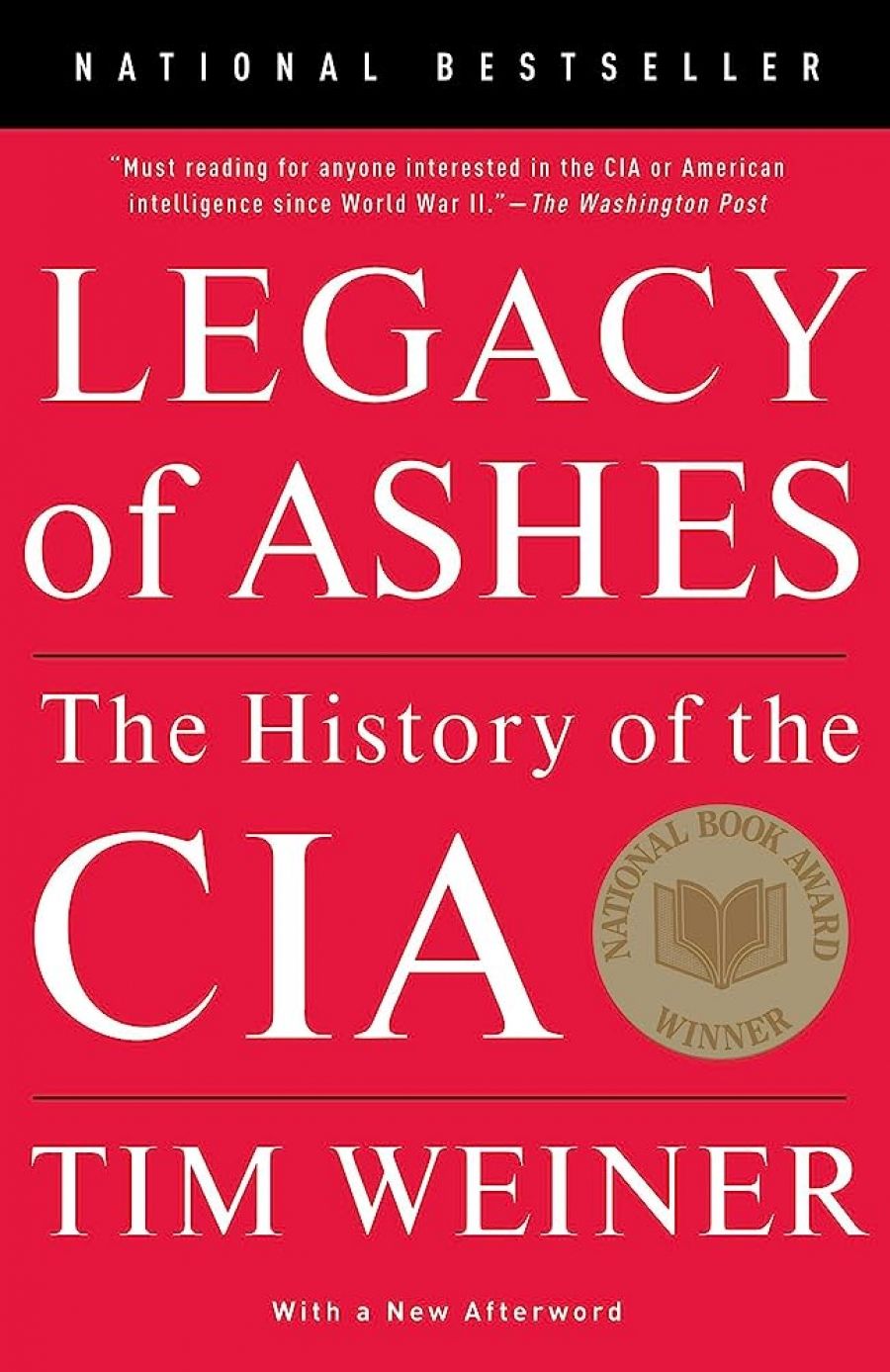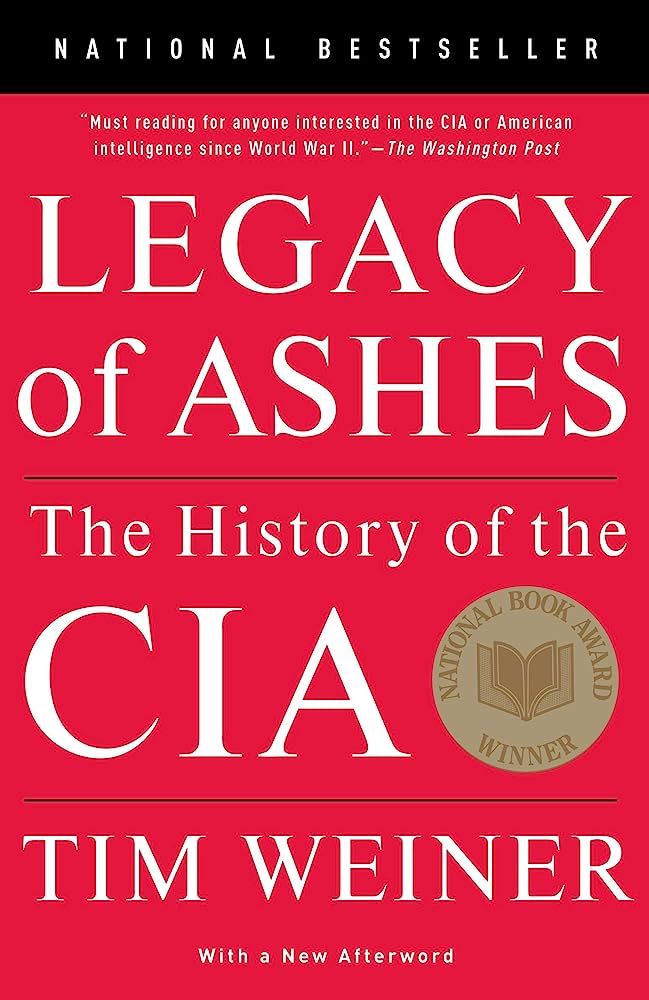
- Free Article: No
- Contents Category: History
- Review Article: Yes
- Article Title: Ike's Legacy
- Online Only: No
- Custom Highlight Text:
Of the many damning revelations contained in this book, the fact that Allan Dulles, the CIA’s longest serving director (1953–61), would assess the merits of intelligence briefings by their weight is among the most startling. Coming in at 700 pages, Tim Weiner’s Legacy of Ashes: The History of the CIA is sufficiently hefty to have commanded Dulles’s attention. Were he alive today to read this searing indictment of the institution he did so much to construct, however, it is doubtful that Dulles would find much cause for cheer.
- Book 1 Title: Legacy of Ashes
- Book 1 Subtitle: The History of the CIA
- Book 1 Biblio: Allen Lane, $35 pb, 702 pp
- Book 1 Cover Small (400 x 600):

- Book 1 Cover (800 x 1200):

Weiner depicts an agency that, from its inception, was torn between competing conceptions of its role. On the one hand were those who saw the need for the creation of a clandestine service devoted to gathering and channelling intelligence to the president. Against this view were pitted those, Dulles chief among them, who believed that the agency’s future lay in covert action. Weiner contends that the latter camp prevailed, with disastrous consequences.
Weiner makes much of the attributed assertion that, a decade into its existence, the CIA was possessed of a ‘great reputation and a terrible record’. It was an obviously perilous disconnection, likely to lead to the agency being entrusted with tasks beyond its capabilities and to undue credence being afforded to its conclusions. On Weiner’s telling, the subsequent half-century has seen the agency’s record and reputation edge ever closer: to its record have been added fifty years of catastrophic endeavour, while its reputation has been stripped of its façade of omnipotence.
It was perhaps not until its recent Iraqi travails that the agency’s reputation and record reached perfect alignment. What is described here as ‘the worst body of work in the agency’s history’ culminated in its then director, George Tenet, infamously asserting the ‘slam dunk’ case of Iraq’s weapons of mass destruction. What this did for the agency’s record, George W. Bush did for its reputation with his offhand observation that the agency was ‘just guessing’ as to the prospects of the occupation. If comfort can be taken from the bridging of this misalignment, it is that no longer will the CIA’s reputation lure an undeserved trust: ‘if we are not believed, we have no purpose.’ As Nietzsche said, it is easier to cope with a bad conscience than a bad reputation.
The book takes its title from Eisenhower’s final, frustrated lament upon realising that he had failed to change the focus of an agency dangerously preoccupied with covert operations. He bemoaned that he would ‘leave a legacy of ashes’ to his successor. Eisenhower’s horror at his bequest would have been still greater had he foreseen the ramifications of what, at the time of his doleful prediction, was in his mind the agency’s greatest triumph: the CIA-backed ousting of the Iranian government in 1953. Weiner convincingly argues that the installation of the shah directly presaged the 1979 Islamic Revolution, perpetrated by a generation of Iranians who had grown up aware that the shah was a puppet of the United States. This is cited as just one example of the CIA’s ostensible triumphs providing the kindling for future infernos: ‘A blaze of glory for the covert operators of the CIA’s greatest generation became a tragic conflagration for their heirs.’ Legacy of Ashes is replete with such metaphorical flourishes, so much so that, were he even remotely optimistic about the agency’s future, the book would surely conclude with allusions to a phoenix rising. It does not.
In advancing his thesis that the agency’s reputation has, for most of its existence, been bloated by illusory successes, Weiner can hardly fail to mention the CIA’s ultimately ill-fated interferences in Iraq and Afghanistan. On Iraq, a former Ba’ath Party interior minister is quoted as saying, ‘We came to power on a CIA train’. Weiner notes that one of its passengers was Saddam Hussein. On Afghanistan, Weiner criticises the CIA’s failure to foresee that the Islamists it so successfully armed against the Soviets would eventually fix their sights on the United States.
In less accomplished hands, these instances of ‘blowback’ too often become hackneyed exhibits to isolationist arguments. In Weiner’s they are adroitly woven into a more interesting contention that much of the CIA’s misguided meddling was borne of self-deceit. It all started with Iran. The agency’s alacrity in accepting the praise for its role in the coup set a dangerous precedent. Too few realised, let alone acknowledged, the truth that the coup had been ‘a unique case of supplying just the right amount of marginal assistance in the right way at the right time’. While presented here as leading inexorably to the events of 1979, the coup’s greater impact may have been the misapprehension it conjured: ‘The illusion that the CIA could overthrow a nation by sleight of hand was alluring.’ Weiner portrays this illusion as fuelling a dangerously stubborn myth of the magic of covert action, the persistence of which was only aggravated by the ‘triumphs’ in Iraq and Afghanistan.
Tellingly, the final of the book’s six parts, which takes in the Clinton and George W. Bush years, is entitled ‘The Reckoning’. Weiner quotes the conclusion of a recently declassified report, commissioned by a chastened Tenet to investigate where it had all gone wrong, that the impact on the agency of the demise of the Soviet Union was ‘analogous to the effect of the meteor strikes on the dinosaurs’. The book’s final part traces the agency’s vain attempts to find its place in a world that no longer supplied it with a unifying purpose.
The picture painted by Weiner is unremittingly bleak. The CIA’s accomplishments, if acknowledged, are given short shrift. Commenting on Tenet’s memoirs, Weiner magnanimously notes that Tenet ‘justly boasted of the CIA’s successes […] at dismantling secret weapons programs in Pakistan and Libya’. Successes? I fruitlessly scoured the book in search of any mention of them.
In passing judgment on the cavalcade of directors who have served at the agency’s helm, Weiner is unsparing. The agency’s third director, Rear Admiral Roscoe Hillenkoetter, ‘a miscast man [who] exuded insignificance’, gets off lightly. The only director to emerge with his reputation intact is John McCone, who correctly read the intelligence on Vietnam and conveyed to President Lyndon Johnson the news he did not want to hear: that his country’s continued involvement in Vietnam would lead to it being mired in an intractable war. LBJ, who ‘liked the agency’s work only if it fit his thinking’, paid no heed. Weiner recounts LBJ’s typically homespun analysis of the agency’s merit, centred on Bessie, a cow he had milked in his youth:
I’d get her in the stanchion, seat myself, and squeeze out a pail of fresh milk. One day I’d worked hard and gotten a full pail […] and old Bessie swung her shit-smeared tail through that bucket of milk. Now, you know that’s what these intelligence guys do. You work hard and get a good policy going, and they swing a shit-smeared tail through it.
Weiner’s methods are more meticulous, but the effect of his chilling dissection of the agency’s past on the readers’ impression of the CIA is akin to that of Bessie’s tail on LBJ’s hard-earned pail.


Comments powered by CComment